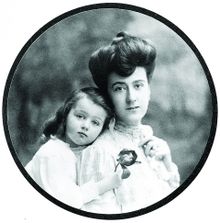Edith Stuyvesant Vanderbilt
| Edith Stuyvesant Dresser Gerry | |
|---|---|

Edith and her daughter, Cornelia, ca. 1902
|
|
| Born |
Edith Stuyvesant Dresser January 17, 1873 Newport, Rhode Island |
| Died | December 21, 1958 (aged 85) Providence, Rhode Island |
| Spouse(s) |
George Washington Vanderbilt II (m. 1898; his death 1914) Peter Goelet Gerry (m. 1925; his death 1957) |
| Children | Cornelia Stuyvesant Vanderbilt |
| Parent(s) | George Dresser Susan Fish LeRoy |
| Relatives |
Daniel LeRoy Dresser (brother) John Nicholas Brown (brother-in-law) George Vanderbilt Cecil (grandson) William Vanderbilt Cecil (grandson) |
Edith Stuyvesant Dresser Gerry (January 17, 1873 – December 21, 1958) was an American philanthropist and wife of George Washington Vanderbilt II and Peter Goelet Gerry, a United States Senator from Rhode Island.
Edith Stuyvesant Dresser was born on January 17, 1873 in Newport, Rhode Island to George Warren Dresser (1837–1883) and Susan Fish Le Roy (1834–1883). She was the great-niece of Hamilton Fish (1808–1893), a U.S. Secretary of State, U.S. Senator, and New York Governor. Through the Fish family, she was a descendant of Peter Stuyvesant, the first governor of Dutch colonial New York through Hamilton Fish's mother, Elizabeth Stuyvesant, Peter Stuyvesant's great-great-granddaughter. She was orphaned at the age of ten and was raised by her maternal grandmother.
Her elder brother was Daniel LeRoy Dresser (1862–1915), a shipbuilder. Her sisters and her, collectively known as the "Dresser girls," were: Suzanne Leroy Dresser (1864–1960), who married the French Vicomte, Romain D'Osmoy, Natalie Bayard Dresser (1869–1950), who married John Nicholas Brown, and Pauline Georgina Dresser (b. 1876), who married Rev. George D. Merrill,
Edith was a compassionate person; many said that one would not have known she was the mistress of the Biltmore Estate. She was very involved with the families who worked on the Biltmore Estate as well as the surrounding community. Edith and her husband, George Vanderbilt, were socially progressive thinkers who played pivotal roles in the betterment of the lives of many people in Western North Carolina.
Some of her initiatives included sponsoring literacy and educational programs, and promoting the learning of crafts through which women might support themselves. On the Estate, she took maternity baskets to women who just given birth to make sure they had everything they needed. Edith also took her daughter Cornelia's old clothing to families with girls who were about the same age.
...
Wikipedia
